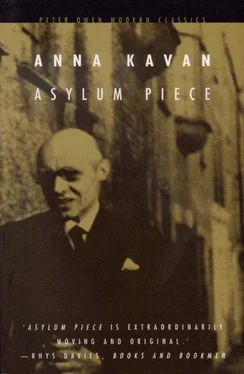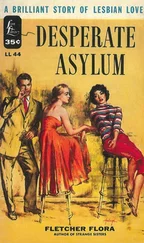It is just after noon on a hot summer day. The interview is ended. The chief doctor rises behind his desk. He is as tall as his visitor, but handsome, slender and in the prime of life, with thick, wavy hair which he wears rather long and which is just starting to be becomingly streaked with grey. He is dressed in a beautiful silver-grey suit and brown and white shoes. The room is large, lofty and expensively furnished, but rather dark with curtains drawn over the french windows. There is a perceptible odour of eau de cologne ambrèe which emanates from the doctor’s person. One feels that a slightly mysterious atmosphere has been aimed at with a view to impressing visitors. There are flowers and a number of large, dim, allegorical pictures.
The couple move slowly towards the door. The wife is distressed and reluctant to leave. There is something she wants to say, but she is intimidated by the atmosphere of the room and by the doctor who looks to her like a film actor. Finally she manages to bring out a question.
‘Couldn’t I please, doctor, see her just for a minute before we go? We’ve come all this way — and it’s such a long time since I saw her…’ Her voice, just as one would expect, is humble and diffident. The poor old lady is tired out with travelling and not far from tears as she stands there nervously clasping her shapeless black handbag and gazing at the head doctor with imploring eyes.
‘My dear madame, it would be the greatest mistake. It would upset your daughter and possibly cause a relapse. I’m extremely sorry, but we must consider the patient’s best interests before everything, mustn’t we? I assure you that she has settled down most satisfactorily, I am very pleased with her progress, and I have excellent reports of her from my doctors as well. You can leave her in our hands without the slightest anxiety. She is well and happy and has taken remarkably well to our community life.’
The cultured voice sounds softer than silk, but the mother hardly hears the last part of the speech. She grasps only that she is not to be permitted to see her child who is so close to her, perhaps even within calling distance, hidden away behind all these invisible barriers of medical authority and discipline. A mist comes in front of her eyes, she can no longer see very clearly where she is going; but this does not matter because her husband takes her by the arm and steers her firmly through the door.
‘We must be guided in everything by the doctor’s advice,’ he is saying. And then she hears him refusing an invitation to lunch at the chief’s private house. ‘A thousand thanks — no. We shall just be in time to catch the express from Lausanne.’ Tremulously, she walks down the polished corridor, supported by the inexorable arm of her husband. She does not see the white coated attendant who is escorting them. She feels very old, and chilly in spite of the heat. Now there is nothing before her but the tiresome, exhausting train journey back to her empty home.
The head doctor is relieved to have got rid of the elderly pair. He had quite expected that he would have to entertain them to lunch. As soon as he ceases to hear the sound of the car carrying them away, he opens a window and steps out into the sunshine. His house is a short distance off, on the shore of the lake. As he walks towards it, everyone whom he passes stops to salute and admire the fine — looking, clever, successful, debonair physician with his graceful, athletic stride.
Meanwhile, Mademoiselle Zèlie is getting ready for lunch in her own room. She is a plump, heavy-looking girl in the early twenties, who has rather the air of an enormously bloated child. Her body seems unwieldy like a young child’s, and her face has the childish simplicity that includes some cunning. Her complexion is pale and unhealthy, her hair needs a shampoo. She has altogether a rather slatternly aspect: her stockings are wrinkled, there is a gap at the back between her white linen skirt and her spotted blouse. Her nurse, who is sitting over some embroidery at the window, suddenly takes a look at her, jumps up and impatiently rearranges her clothing.
‘How is it you can’t keep yourself tidy, mademoiselle?’ she says in a scolding voice. ‘I’m always putting you right and you’re as bad again in two minutes. Your hair, too — you haven’t combed it yet. And your hands — have you washed them for lunch? Let me look — no, of course not. Go on now, give them a good scrub with the brush; the nails are quite black.’ And she gives the girl a little push towards the washbasin.
Zèlie obediently turns on the taps. As the water is running into the basin, she glances at her companion with dislike. This is a new nurse: her nurses never stay long with her. ‘Why does she nag at me like that?’ she is thinking. ‘To have one of these stupid creatures with me all the time, day and night… their stupid voices going on and on… just peasant women, too, who don’t understand anything — it’s insupportable. If only my mother would come… If only I could tell her… She would never allow it.’
Standing there with her hands in the water she has quite forgotten what she is supposed to be doing. The nurse comes up with the expression of a person restraining herself in exasperating circumstances, lets out the water, gives her a towel and briskly and efficiently tidies her hair. ‘There, now; we must hurry. The gong’s gone — didn’t you hear it?’
Zèlie is glad to go into the dining-room; she is fond of her food. But to day her pleasure is spoilt by the fact that her place has been laid next to a young Italian whom she detests. As she sits down between him and her nurse, she glances with sidelong suspicion at the shock-headed, narrow-eyed youth who teases her and confuses her with his spiteful tricks.
To-day it seems as though he is going to leave her in peace. He says nothing at all until the first course has been eaten and taken away. Then, just as the waiters are making a subdued clatter with the fresh plates, he leans towards her and whispers into her ear: ‘And how were your mother and father to-day, mademoiselle?’
‘My mother and father? They haven’t been here.’ She looks at him blankly, yet with distrust, out of her sparkless eyes.
‘Oh, yes, indeed — they were here this morning. I was in the corridor when they came out of the doctor’s study. He was saying good-bye to them. I saw them and heard the name quite distinctly.’ The Italian boy seems to be only interested in his food, but really he is all attention, all on the alert.
Zèlie takes a mouthful of veal from her plate. Suddenly she grasps the meaning of what has just been said to her; the implication of the words dawns upon her. She lets her knife and fork fall. ‘My mother has been here… and she went away… without seeing me!’
Her chair is on the side of the table nearest the double doors. The doors are almost immediately behind her chair. She has only to get up and take two or three steps and then she is out of the room. For a moment everything hangs in suspense. The waiters stand poised with their dishes. There has been no noise, no disturbance: for a moment no one seems to realize what has happened. Then the girl’s nurse rises and follows her. Here and there about the room other figures also get to their feet and go out. The young Italian bends low over his plate. His mouth is crammed full of food, his jaws solemnly chewing. But an impish glee crinkles the ends of his eyes: he is happy.
Zèlie runs across the hall towards the chief doctor’s study. The main door of the clinic is wide open and her pursuers will naturally assume that she has gone out that way. It is not with the idea of eluding them that she goes to the study, but simply because the Italian said he had seen her mother there. Of course, the room is now empty; but the french window is still open as the doctor left it, and Zèlie passes through. Now she is on a grass bank that slopes down to a pine wood. She runs down the steep bank, moving clumsily, tripping and stumbling in her high-heeled shoes which do not fit very well. In the wood she still finds it hard to run because the pine needles are slippery, and treacherous roots are continually tripping her up. She is out of condition and soon feels exhausted. Her breath makes a painful sobbing sound in the quiet wood, her heart-beats sound loud and continuous like a waterfall, her face, streaked with her tumbled hair, is glazed over with sweat, one of her shoes has gone and she is completely dishevelled. She does not know why she is running or where. One word, ‘Mother! Mother!’ keeps crying out in her head.
Читать дальше












